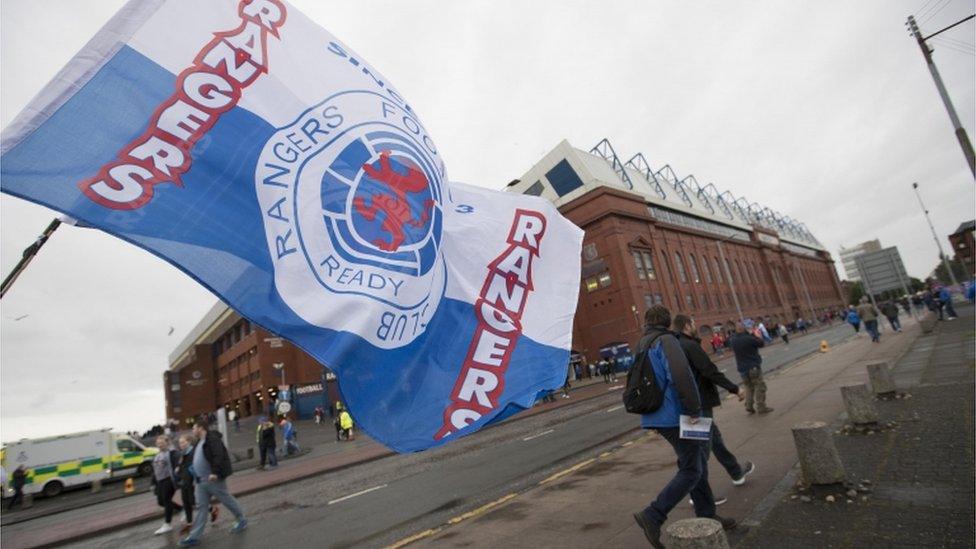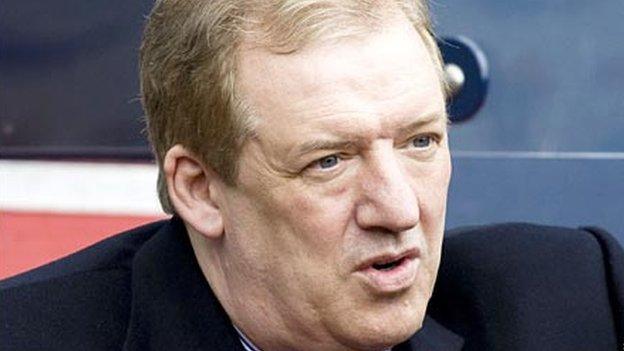HMRC wins Rangers 'big tax case' ruling
- Published
Lord Hodge dismisses the appeal against HMRC
The Supreme Court has ruled in favour of HM Revenue and Customs (HMRC) in its fight with Rangers over the club's use of Employee Benefit Trusts (EBTs).
More than £47m was paid to players, managers and directors between 2001 and 2010 in tax-free loans.
However, HMRC argued the payments were earnings and should be taxable.
The court's decision is not expected to have any material or financial impact on Rangers now as the club is owned by a different company.
Rangers' use of EBTs and the subsequent appeals by HMRC became known as the "big tax case".
Two tribunals in 2012 and 2014 had previously found in Rangers' favour, but the Court of Session found in favour of HMRC after an appeal in 2015.
Liquidators BDO were then allowed to appeal to the Supreme Court in London as the ruling has implications for future cases.
On Wednesday, the Supreme Court unanimously dismissed RFC's appeal and ruled in favour of HMRC.


Analysis by Chris McLaughlin, BBC Sport
There will undoubtedly be calls for the football authorities to act following this judgement.
A Scottish Premier League investigation headed by Lord Nimmo Smith found Rangers guilty of not registering players properly and the company was fined in 2013.
Nimmo Smith's judgement was made at a time when the EBT scheme was deemed acceptable by a tax tribunal and he resisted calls for the club to be stripped of honours won during the years the scheme was in operation, saying "Rangers FC did not gain any unfair competitive advantage from the contraventions of the SPL Rules."
It's unlikely the football authorities will have much appetite to sanction another investigation but that won't stop some calling for just that.
A spokesman said the Scottish Premier Football League will "take time to examine the judgement in detail and to consider any implications."

The result is a major victory for HMRC in its attempts to recoup tax from thousands of other companies which ran EBTs and similar schemes, which were the subject of a crackdown in legislation enacted in December 2010.
HMRC could now issue "follower notices", which would demand payment from companies who ran similar schemes.
'Discretionary bonuses'
A number of football clubs in England fall into this category.
A settlement opportunity in light of the 2010 legislation ran out in July 2015 and other firms could now be liable for major sums.
In a written judgment, the judges said: "The sums paid to the trustee of the Principal Trust for a footballer constituted the footballer's earnings. The risk that the trustee might not set up a sub-trust or give a loan of the sub-trust funds to the footballer does not alter the nature of the payments made to the trustee of the Principal Trust.
"The discretionary bonuses made available to RFC's employees through the same trust mechanisms also fall within the tax charge as these were given in respect of the employee's work.
"Payment to the Principal Trust should have been subject to deduction of income tax under the PAYE regulations."

Sir David Murray took control of Rangers in 1988 and sold the club in 2011
The EBT scheme was administered by the Murray Group, then majority shareholder of the Glasgow club, from 2001 to 2009.
In February 2012, Rangers, which was then run by Craig Whyte, went into administration over a separate tax debt and the tax authority rejected a creditors agreement in June of that year.
The supreme court decision is in relation to Murray Group companies, including the liquidated company RFC 2012, and not the current owners at Ibrox.
The result will mean the creditors of RFC 2012 will receive less money from the pot collected by liquidators BDO, as HMRC will now be owed more money.
'Creditor dismay'
Former Rangers chairman Sir David Murray said he was "hugely disappointed" with the verdict, which he said ran counter to the legal advice which was consistently provided to Rangers Football Club.
He said: "It should be emphasised that there have been no allegations made by HMRC or any of the courts that the club was involved in tax evasion, which is a criminal offence.
"The decision will be greeted with dismay by the ordinary creditors of the club, many of which are small businesses, who will now receive a much lower distribution in the liquidation of the club, which occurred during the ownership of Craig Whyte, than may otherwise have been the case."
In a statement, HMRC said: "This decision has wide-ranging implications for other avoidance cases and we encourage anyone who has tried to avoid tax on their earnings to now agree with us the tax owed.
"HMRC will always challenge contrived arrangements that try to deliver tax advantages never intended by parliament."
Rangers liquidators BDO said it believed taking the case to the Supreme Court had been the correct course of action "given the significance of the matter".
It said: "We will now engage with HMRC on adjudicating its claim.
"Further advice and guidance will be provided to creditors in due course."
The Scottish FA said that, after examining the judgement, it would take no further disciplinary action.
It said it had been advised it was unlikely the Scottish FA would be successful pursuing a complaint about whether disciplinary rules could have been breached.
It added that, even if successful, any sanctions available to a judicial panel would be limited in their scope.
Meanwhile, Celtic said they were sure that the football authorities would review their findings that Rangers gained no sporting advantage from the tax-avoidance scheme.
A league commission fined Rangers in 2013 but did not strip the club of any titles they had won during the years the scheme was in operation.
Celtic disagreed with that ruling at the time, and said the Supreme Court judgement "re-affirms that view."